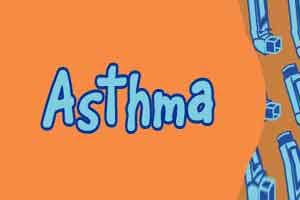- Home
- Editorial
- News
- Practice Guidelines
- Anesthesiology Guidelines
- Cancer Guidelines
- Cardiac Sciences Guidelines
- Critical Care Guidelines
- Dentistry Guidelines
- Dermatology Guidelines
- Diabetes and Endo Guidelines
- Diagnostics Guidelines
- ENT Guidelines
- Featured Practice Guidelines
- Gastroenterology Guidelines
- Geriatrics Guidelines
- Medicine Guidelines
- Nephrology Guidelines
- Neurosciences Guidelines
- Obs and Gynae Guidelines
- Ophthalmology Guidelines
- Orthopaedics Guidelines
- Paediatrics Guidelines
- Psychiatry Guidelines
- Pulmonology Guidelines
- Radiology Guidelines
- Surgery Guidelines
- Urology Guidelines
Blocking this gene can help prevent risk of asthma

London : Scientists have discovered that blocking a gene associated with the development of asthma can potentially prevent the lung disease at its origin in a finding that could challenge the current understanding of the condition.
In the study, the research analysed the impact of ADAM33 a gene that is associated with the development of asthma.
ADAM33 makes an enzyme, which is attached to cells in the airway muscles.
When the enzyme loses its anchor to the cell surface, it is prone to going rogue around the lung causing poorer lung function in people who have asthma.
The findings showed that by switching off this ADAM33 gene or preventing it from going rouge, the characteristic features of asthma such as airway remodelling (more muscle and blood vessels around the airways), twitchiness and inflammation, can be reduced.
“Our studies have challenged the common paradigm that airway remodelling in asthma is a consequence of inflammation. Instead, we have shown that rogue human ADAM33 initiates airway remodelling that promotes allergic inflammation and twitchiness of the airways in the presence of allergen,” said lead author Hans Michel Haitchi, Associate Professor at the University of Southampton in Britain.
ADAM33 gene initiated airway remodelling reduces the ability of the lungs to function normally, which is not prevented by current anti inflammatory steroid therapy.
Therefore, stopping this ADAM33 induced process would prevent a harmful effect that promotes the development of allergic asthma for many of the 5.4 million of people, said the paper published in the Journal of Clinical Investigation (JCI) Insight.
In mice that did not have the rogue gene, airway remodelling and twitchiness as well as airway inflammation rates were significantly reduced by 50 per cent and respectively 35 per cent.
In the first study, rogue human ADAM33 caused airway remodelling resulting in more muscle and blood vessels around the airways of developing lungs but it did not cause inflammation.
However, when a house dust mite allergen was introduced, which is a common human allergen, both, airway remodelling and allergic airway inflammation were more significantly enhanced.
In another study, remodelling of the airway was shown in mice that had ADAM33 gene switched on from in utero.
When the gene was switched off the airway remodelling got completely reversed.
“These findings identify ADAM33 as a novel target for disease modifying therapy in asthma,” the researchers concluded.

Disclaimer: This site is primarily intended for healthcare professionals. Any content/information on this website does not replace the advice of medical and/or health professionals and should not be construed as medical/diagnostic advice/endorsement or prescription. Use of this site is subject to our terms of use, privacy policy, advertisement policy. © 2020 Minerva Medical Treatment Pvt Ltd